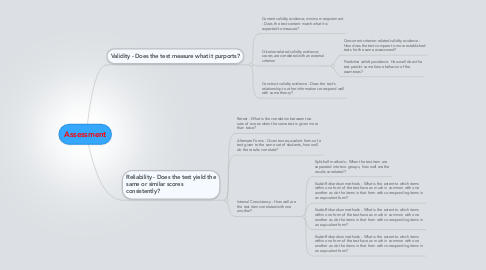
1. Validity - Does the test measure what it purports?
1.1. Content validity evidence; minimum requirement - Does the test content match what it is expected to measure?
1.2. Criterion-related validity evidence; scores are correlated with an external criterion
1.2.1. Concurrent criterion-related validity evidence - How does the test compare to more established tests for the same assessment?
1.2.2. Predictive validity evidence: How well does the test predict some future behavior of the examinees?
1.3. Construct validity evidence - Does the test's relationship to other information correspond well with some theory?
2. Reliability - Does the test yield the same or similar scores consistently?
2.1. Retest - What is the correlation between two sets of scores when the same test is given more than twice?
2.2. Alternate Forms - Given two equivalent forms of a test given to the same set of students, how well do the results correlate?
2.3. Internal Consistency - How well are the test item correlated with one another?
2.3.1. Split-half methods - When the test item are separated into two groups, how well are the results correlated?
2.3.2. Kuder-Richardson methods - What is the extent to which items within one form of the test have as much in common with one another as do the items in that form with corresponding items in an equivalent form?
2.3.3. Kuder-Richardson methods - What is the extent to which items within one form of the test have as much in common with one another as do the items in that form with corresponding items in an equivalent form?
2.3.4. Kuder-Richardson methods - What is the extent to which items within one form of the test have as much in common with one another as do the items in that form with corresponding items in an equivalent form?
